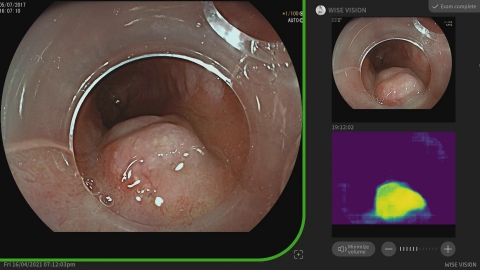NEC Corporation (NEC; TOKYO: 6701) today announced the development of an AI technology for supporting doctors to detect neoplasia in Barrett’s esophagus during endoscopic procedures. This is the world’s first technology of its kind to comply with the requirements for CE mark labeling, a European safety, health and environmental protection standard (*1), and is being released as WISE VISION® Endoscopy, where it will soon be available in Europe to help doctors in the detection of Barrett’s neoplasia (*2).
This press release features multimedia. View the full release here: https://www.businesswire.com/news/home/20210528005090/en/

Provided by Professor Pradeep Bhandari: “Once the neoplasia is found, the system takes a still image and transfers it to the top right corner of a screen as a reference image for endoscopists. It also has a heat map which shows the area of the AI-predicted neoplasia.” (Graphic: Business Wire)
This software is connected to endoscopy processors and automatically notifies users of potential Barrett’s neoplasia from images captured during endoscopic procedures.
Barrett’s esophagus is a pre-cancerous condition in which the inner lining of the esophagus is replaced by a lining that resembles that of the stomach. Patients with Barrett’s esophagus have 30-40 fold higher risk of developing cancer of the esophagus as compared to the normal population (*3).
However, if this cancer can be detected at an early stage, then it can be removed through the endoscope and a patient can be cured.
To help resolve this issue, NEC collaborated with Professor Pradeep Bhandari (Portsmouth, UK), Chair of the European Society of Gastrointestinal Endoscopy (ESGE) Research Committee, in development of this new technology to support doctors to detect Barrett’s neoplasia during examination. In developing this solution, NEC applied its face recognition technology that has been highly evaluated (*4) by the National Institute of Standards and Technology (NIST) in the United States, and belongs to NEC’s portfolio of cutting-edge AI technologies, “NEC the WISE.”
“I am delighted that NEC, as one of the world’s leaders in AI technology, has entered the field of endoscopy and developed WISE VISION® Endoscopy to detect and help manage Gastrointestinal neoplasia,” said Professor Pradeep Bhandari, Chair of the ESGE Research Committee.
For More Information
URL: https://www.nec.com/en/press/202105/global_20210528_01.html
Notes:
(*1) Source: NEC Corporation
(*2) “WISE VISION” is a registered trademark of NEC Corporation in the United States of America, the European Union and the United Kingdom.
(*3) Sharma P. Clinical practice. Barrett’s esophagus. N Engl J Med. 2009 Dec 24;361(26):2548-56. doi: 10.1056/NEJMcp0902173. Erratum in: N Engl J Med. 2010 Apr 15;362(15):1450. PMID: 20032324.
(*4) NEC Face Recognition Technology Ranks First in NIST Accuracy Testing
https://www.nec.com/en/press/201910/global_20191003_01.html
View source version on businesswire.com: https://www.businesswire.com/news/home/20210528005090/en/
![]()










